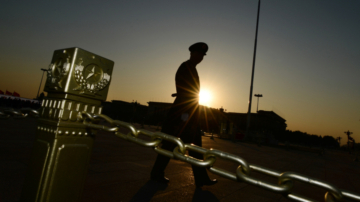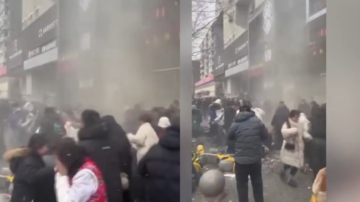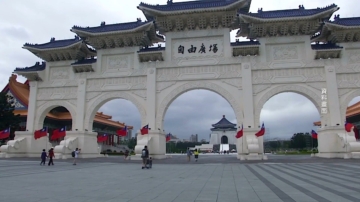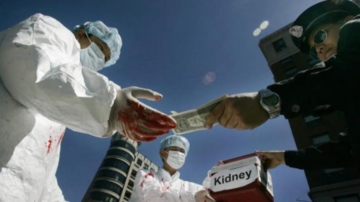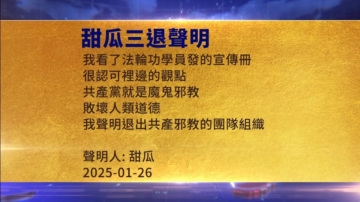【新唐人2014年01月29日讯】中国大陆去年的房地产市场可用“高烧不退”来形容,不过进入2014年,多位业内大腕和专家、学者都表达了对楼市的不同看法。“华远地产”董事长任志强十几年来第一次提出房地产风险,大陆经济学家谢国忠甚至预测,大陆房价在2014年会下跌50%。
去年,大陆新建商品住宅,与上年同月相比,70个大中城市中,价格下降的城市有1个,上涨的城市有69个,其中北京、上海、广州、深圳4城市,年度涨幅都超过了20%。而去年房地产企业全年销售额超过百亿的达71家,有6家房企更是突破一千亿。
21号,大陆“华远地产”董事长任志强在一个地产颁奖典礼上表示,目前最担心的是,大陆房地产开发商还认为,今年的房地产市场保持着和去年一样的涨幅。他说:“我做了十几年房地产报告,今年第一次提出‘风险’两个字。”他预测,今年房企销售增速,可能不到百分之十。
1月18号,在一个地产峰会上,任志强指出,由于中央政府的调控政策错误,导致供求关系逐步恶化,今年房价增幅下滑是必然的。
大陆“万达集团”董事长王健林也表示,很多二线城市已经出现房子卖不动的迹象,再加上流动性收紧,大可不必担心今年房价会飙升。
大陆经济学家谢国忠,日前接受北京“全球财经新见地《BWCHINESE》”中文网站的专访时指出,最后一波房地产泡沫是靠高利贷推起的,现在高利贷出了问题,房价也支撑不住了。他预测,今年大陆房价会下跌50%。
而大陆经济学者杨斌认为,大陆房价非常不合理,但要下跌,没那么简单。
大陆经济学者杨斌:“中国的房价本来就泡沫,北京周边的房价就高于美国别墅的价格,非常夸张,非常不合理。是不是2014年,如果跌的话,我估计也要下半年去了,不是那么简单。嚷嚷也不是3年、5年了,谁都解决不了,它就这么着,这就中国特色。”
而大陆经济学者芧于轼表示,房产泡沫的形成有4个原因。
大陆经济学者芧于轼:“一个是经济的高增长,第二个是收入分配的不平均,下一个是富人的钱没有地方去投资,四是土地政策,市场被垄断了。降到百分之五十,就是泡沫破裂。那很糟糕的,建筑业,尤其百万人就业就要失业了,房地产的上游下游的工业都要受影响,整个GDP要降低下来。”
不过,大陆资深地产策划人“徽湖”日前发表博文《土地盛宴让地方政府成“土豪”》,文中指出,这些年来,全球经济中国一枝独秀,最根本的原因就是房地产的高速发展。
中共国务院直属事业单位“国家行政学院”教授许正中,最近也向媒体表示,确实有政府主导、推动的城镇化绑架房地产的现象。在现有体制下,地方财政支出责任大,不得不靠融资平台大规模举债。为了偿债,房地产成为“二财政”和“提款机”,有的地方甚至成为“主财政”和“摇钱树”。
谢国忠认为,房产泡沫破灭对中国是大好事。杨斌也表示,房价高只有开发商和地方政府得利。
杨斌:“我希望它跌下来,谁都希望它跌下来,这太不合理了。大陆人一生的收入还买不到房子,政府联合开发商,就他们赚钱,政府卖地,开发商赚钱,然后垄断价格,把老百姓一生的劳动一次性剥夺。645房价严重影响中国消费能力,一个房价就把你消费能力全都打压了。”
据官方粗略估计,地方政府和银行2012年从房地产获得收入4万7917亿元,占全年房地产业销售额6万4000亿元的75%。地方政府从房地产行业拿走的土地出让金和税费比例偏高,已成不争的事实。
英国《经济学人》周刊最近报导说,大陆的房产市场令人担忧,一些富商巨贾,如中国最大住宅开发商“万科集团”董事长王石,和香港首富李嘉诚,都已经对大陆房产的泡沫化现象采取应变措施。
采访/常春 编辑/陈洁 后制/郭敬
Chinese Realtor: 2014 Real Estate Risk Falling Prices
The Chinese real estate market was booming last year.
However, real estate tycoons and experts have different views
on the Chinese market for 2014.
Beijing Huayuan Property Chairman Ren Zhiqiang discussed
real estate risk using more than a decade of real estate career
experience.
Economist Andy Xie predicted a 50% fall of the Chinese
property market value.
Last year, new property prices rose in 69 cities except one.
The annual increase rate was more than 20% in Beijing,
Shanghai, Guangzhou, and Shenzhen.
As many as 71 real estates have made over 10 billion yuan in
sales last year, six even made more than 100 billion yuan.
Beijing Huayuan Property Chairman Ren Zhiqiang revealed
his worry over real estate on January 21 at a real estate event.
Even though the Chinese realtors believe the market will remain
the same gains as last year, he said, “I have done more than
10 years of real estate reports. This year, for the first time,
I am talking about the risk.”
He predicted that sales growth in 2014 may be less than 10%.
In a summit on Jan. 18, Ren Zhiqiang pointed out that, central
government's control policy errors have led to a gradual
deterioration of supply and demand, the decline in the price
increases this year is inevitable.
Dalian Wanda Group Chairman Wang Jianlin also indicated
sales have staggered in many second-tier cities, with the slow
down on demand, the price is unlikely to soar this year.
In an exclusive interview with Chinese Business Wisdom,
economist Andy Xie said that the last wave of the real estate
bubble was pushed up against money lending.
The real estate prices will not stand in the face of cash flow
Issues and he predicted that house prices will drop by 50%.
Economist Yang Bin believes the unreasonable real estate
prices are doomed to fall but, not so easily.
Yang Bin, economist: "China's housing prices have been a
growing bubble.
Prices in Beijing have been exaggerated and unreasonably
higher than similar in the United States.
Is it going to be 1024? Even if the price drops, I believe it will
be in the second half of the year.
It is not so simple. It has been going like this for these years.
No one can resolve it and this is the Chinese characteristic."
Economist Su Yushi analyzes the four reasons contributing to
the formation of the housing bubble in China.
"Firstly, it is the high growth in economy.
Secondly, uneven distribution of income, thirdly a lack of
investment means for the wealthy people.
Fourth is the market has been monopolized due to the land
policy. The 50% price fall means the burst of the bubble.
That will be very bad for the construction industry.
Millions of people will lose their jobs.
Both upstream and downstream of the real estate industry
will be affected. The entire GDP will go down."
Senior estate planner Hui Hu recently published a blog titled:
"The land feast makes local government the Tyrant" stating
rapid real estate development in China has made it's economy
thrive in the world.
Chinese Academy of Governance Professor Xu Zhengzhong
also recently told the media that the urbanization governed by
the regime indeed drove real estate.
Under the current system, the mass local fiscal expenditure
has relied on enormous financing platforms.
To pay back the debt, real estate has become the alternative
fiscal and cash machine, and even the main financial source
and cash cow for some places.
Andy Xie believed that China's real estate bubble bursting
is a good thing.
Yang Bin also says that the high prices only benefits
developers and local governments.
Yang Bin: "I want the bubble to fail. We all hope it will fail.
It's too unreasonable. The average Chinese lifetime income
can't manage to buy a house.
The government works with the developers. They make the
profit, one sells the land, and the other make the money.
They monopolize the industry and deprive people of their
life-time hard work.
The high price has seriously affected the spending power of
China. The house prices kill the entire spending power."
According to official estimates, local governments and banks
received 4.8 trillion yuan revenue from real estate in 2012.
This accounted for 75% of the total real estate sales
of 6.4 trillion yuan.
It has become an indisputable fact that local governments
charge exceedingly high land transfer rates and taxes.
The Economist magazine recently reported that some of
China's biggest property moguls appear to be growing uneasy.
Wang Shi, the chairman of China Vanke, the country's largest
residential property firm by volume, and Li Ka-Shing, a Hong
Kong tycoon, have both taken contingency measures to
deal with the bubble market.
Interview/ChangChun Edit/ChenJie Post-Production/GuoJing
去年,大陆新建商品住宅,与上年同月相比,70个大中城市中,价格下降的城市有1个,上涨的城市有69个,其中北京、上海、广州、深圳4城市,年度涨幅都超过了20%。而去年房地产企业全年销售额超过百亿的达71家,有6家房企更是突破一千亿。
21号,大陆“华远地产”董事长任志强在一个地产颁奖典礼上表示,目前最担心的是,大陆房地产开发商还认为,今年的房地产市场保持着和去年一样的涨幅。他说:“我做了十几年房地产报告,今年第一次提出‘风险’两个字。”他预测,今年房企销售增速,可能不到百分之十。
1月18号,在一个地产峰会上,任志强指出,由于中央政府的调控政策错误,导致供求关系逐步恶化,今年房价增幅下滑是必然的。
大陆“万达集团”董事长王健林也表示,很多二线城市已经出现房子卖不动的迹象,再加上流动性收紧,大可不必担心今年房价会飙升。
大陆经济学家谢国忠,日前接受北京“全球财经新见地《BWCHINESE》”中文网站的专访时指出,最后一波房地产泡沫是靠高利贷推起的,现在高利贷出了问题,房价也支撑不住了。他预测,今年大陆房价会下跌50%。
而大陆经济学者杨斌认为,大陆房价非常不合理,但要下跌,没那么简单。
大陆经济学者杨斌:“中国的房价本来就泡沫,北京周边的房价就高于美国别墅的价格,非常夸张,非常不合理。是不是2014年,如果跌的话,我估计也要下半年去了,不是那么简单。嚷嚷也不是3年、5年了,谁都解决不了,它就这么着,这就中国特色。”
而大陆经济学者芧于轼表示,房产泡沫的形成有4个原因。
大陆经济学者芧于轼:“一个是经济的高增长,第二个是收入分配的不平均,下一个是富人的钱没有地方去投资,四是土地政策,市场被垄断了。降到百分之五十,就是泡沫破裂。那很糟糕的,建筑业,尤其百万人就业就要失业了,房地产的上游下游的工业都要受影响,整个GDP要降低下来。”
不过,大陆资深地产策划人“徽湖”日前发表博文《土地盛宴让地方政府成“土豪”》,文中指出,这些年来,全球经济中国一枝独秀,最根本的原因就是房地产的高速发展。
中共国务院直属事业单位“国家行政学院”教授许正中,最近也向媒体表示,确实有政府主导、推动的城镇化绑架房地产的现象。在现有体制下,地方财政支出责任大,不得不靠融资平台大规模举债。为了偿债,房地产成为“二财政”和“提款机”,有的地方甚至成为“主财政”和“摇钱树”。
谢国忠认为,房产泡沫破灭对中国是大好事。杨斌也表示,房价高只有开发商和地方政府得利。
杨斌:“我希望它跌下来,谁都希望它跌下来,这太不合理了。大陆人一生的收入还买不到房子,政府联合开发商,就他们赚钱,政府卖地,开发商赚钱,然后垄断价格,把老百姓一生的劳动一次性剥夺。645房价严重影响中国消费能力,一个房价就把你消费能力全都打压了。”
据官方粗略估计,地方政府和银行2012年从房地产获得收入4万7917亿元,占全年房地产业销售额6万4000亿元的75%。地方政府从房地产行业拿走的土地出让金和税费比例偏高,已成不争的事实。
英国《经济学人》周刊最近报导说,大陆的房产市场令人担忧,一些富商巨贾,如中国最大住宅开发商“万科集团”董事长王石,和香港首富李嘉诚,都已经对大陆房产的泡沫化现象采取应变措施。
采访/常春 编辑/陈洁 后制/郭敬
Chinese Realtor: 2014 Real Estate Risk Falling Prices
The Chinese real estate market was booming last year.
However, real estate tycoons and experts have different views
on the Chinese market for 2014.
Beijing Huayuan Property Chairman Ren Zhiqiang discussed
real estate risk using more than a decade of real estate career
experience.
Economist Andy Xie predicted a 50% fall of the Chinese
property market value.
Last year, new property prices rose in 69 cities except one.
The annual increase rate was more than 20% in Beijing,
Shanghai, Guangzhou, and Shenzhen.
As many as 71 real estates have made over 10 billion yuan in
sales last year, six even made more than 100 billion yuan.
Beijing Huayuan Property Chairman Ren Zhiqiang revealed
his worry over real estate on January 21 at a real estate event.
Even though the Chinese realtors believe the market will remain
the same gains as last year, he said, “I have done more than
10 years of real estate reports. This year, for the first time,
I am talking about the risk.”
He predicted that sales growth in 2014 may be less than 10%.
In a summit on Jan. 18, Ren Zhiqiang pointed out that, central
government's control policy errors have led to a gradual
deterioration of supply and demand, the decline in the price
increases this year is inevitable.
Dalian Wanda Group Chairman Wang Jianlin also indicated
sales have staggered in many second-tier cities, with the slow
down on demand, the price is unlikely to soar this year.
In an exclusive interview with Chinese Business Wisdom,
economist Andy Xie said that the last wave of the real estate
bubble was pushed up against money lending.
The real estate prices will not stand in the face of cash flow
Issues and he predicted that house prices will drop by 50%.
Economist Yang Bin believes the unreasonable real estate
prices are doomed to fall but, not so easily.
Yang Bin, economist: "China's housing prices have been a
growing bubble.
Prices in Beijing have been exaggerated and unreasonably
higher than similar in the United States.
Is it going to be 1024? Even if the price drops, I believe it will
be in the second half of the year.
It is not so simple. It has been going like this for these years.
No one can resolve it and this is the Chinese characteristic."
Economist Su Yushi analyzes the four reasons contributing to
the formation of the housing bubble in China.
"Firstly, it is the high growth in economy.
Secondly, uneven distribution of income, thirdly a lack of
investment means for the wealthy people.
Fourth is the market has been monopolized due to the land
policy. The 50% price fall means the burst of the bubble.
That will be very bad for the construction industry.
Millions of people will lose their jobs.
Both upstream and downstream of the real estate industry
will be affected. The entire GDP will go down."
Senior estate planner Hui Hu recently published a blog titled:
"The land feast makes local government the Tyrant" stating
rapid real estate development in China has made it's economy
thrive in the world.
Chinese Academy of Governance Professor Xu Zhengzhong
also recently told the media that the urbanization governed by
the regime indeed drove real estate.
Under the current system, the mass local fiscal expenditure
has relied on enormous financing platforms.
To pay back the debt, real estate has become the alternative
fiscal and cash machine, and even the main financial source
and cash cow for some places.
Andy Xie believed that China's real estate bubble bursting
is a good thing.
Yang Bin also says that the high prices only benefits
developers and local governments.
Yang Bin: "I want the bubble to fail. We all hope it will fail.
It's too unreasonable. The average Chinese lifetime income
can't manage to buy a house.
The government works with the developers. They make the
profit, one sells the land, and the other make the money.
They monopolize the industry and deprive people of their
life-time hard work.
The high price has seriously affected the spending power of
China. The house prices kill the entire spending power."
According to official estimates, local governments and banks
received 4.8 trillion yuan revenue from real estate in 2012.
This accounted for 75% of the total real estate sales
of 6.4 trillion yuan.
It has become an indisputable fact that local governments
charge exceedingly high land transfer rates and taxes.
The Economist magazine recently reported that some of
China's biggest property moguls appear to be growing uneasy.
Wang Shi, the chairman of China Vanke, the country's largest
residential property firm by volume, and Li Ka-Shing, a Hong
Kong tycoon, have both taken contingency measures to
deal with the bubble market.
Interview/ChangChun Edit/ChenJie Post-Production/GuoJing

